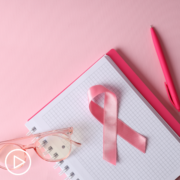Why Breast Cancer Patients Should Share Emotional Concerns With Their Team
Why Breast Cancer Patients Should Share Emotional Concerns With Their Team from Patient Empowerment Network on Vimeo.
What is it important for breast cancer patients to share their emotional concerns? Expert Dr. Bhuvaneswari Ramaswamy reviews common emotional issues that can arise for patients, discusses why it’s important to voice concerns, and shares support options.
Dr. Bhuvaneswari Ramaswamy is the Section Chief of Breast Medical Oncology and the Director of the Medical Oncology Fellowship Program in Breast Cancer at The Ohio State College of Medicine. Learn more about this expert here.
See More from Thrive Breast Cancer
Related Resources:

|

|

|
Transcript:
Katherine:
Yeah, thank you for that. It’s really helpful. And it actually leads us into the next topic. Coping with emotions that come along with a breast cancer diagnosis such as anxiety and depression can be challenging. Why is it important to share emotional concerns with your healthcare team?
Dr. Ramaswamy:
Yeah, so I think one of the things that the breast cancer patients, I mean, I would say all cancer patients, I’ll be honest, or any kind of chronic illness, fearful illness. And I think most what they – I think what hurts them most is the how isolating the journey is because despite having very close family and they might have full trust in their providers. At the end of the day, those fears, those sorrow of potential mortality and all the side effects has to be gone through them. They’ve got to go through that. And then validating their anxiety, validating their fears, validating their symptoms is so important. So, that’s why telling your patient I understand. Whatever it is, you’re going through an isolating journey, it’s hard, and I validate all your concerns that you have.
We can’t really compare apples to apples here like patient to patient because you – we all have an inherent approach to a critical problem. And this is a critical problem that comes into your life and whatever that approach is of what – how you’re going to approach this. So, there’s no right or wrong and how she copes and you cope. And sometimes family does that and sometimes your own friends do that. Like, oh, it’s okay, but see she did well and she and you know and see how she’s coping. It doesn’t help. I think so educating the family as well to say or the spouse particularly validate their concerns, give validation and acknowledge their concerns and then say something positive to help them move forward. And I think these are important. And I think what I tell my patients is that I will never know what you’re going through if you don’t share it with me.
And the same way with all your other physical side effects, there are some things that we can do. We are never going to say, “Well, put up with this. You just have to go through this to get better.” We never say that. We will try to address it in some way. Now, I do understand the limitations of what we can do and it doesn’t always get better to everybody, but if you don’t tell us, we can’t even try.
So, it’s so important to share and sometimes sharing all this reduces the burden on you. So, and I think that’s important as well, so.










